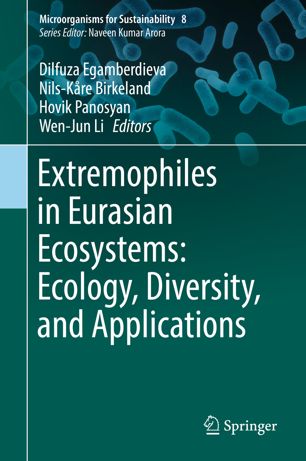

Most ebook files are in PDF format, so you can easily read them using various software such as Foxit Reader or directly on the Google Chrome browser.
Some ebook files are released by publishers in other formats such as .awz, .mobi, .epub, .fb2, etc. You may need to install specific software to read these formats on mobile/PC, such as Calibre.
Please read the tutorial at this link: https://ebookbell.com/faq
We offer FREE conversion to the popular formats you request; however, this may take some time. Therefore, right after payment, please email us, and we will try to provide the service as quickly as possible.
For some exceptional file formats or broken links (if any), please refrain from opening any disputes. Instead, email us first, and we will try to assist within a maximum of 6 hours.
EbookBell Team

4.4
82 reviewsThis book explores various aspects of thermophilic and halophilic microbes from Eurasian ecosystems, which have proved to offer a unique reservoir of genetic diversity and biological source of extremophiles. It also covers the biotechnological uses of extremophiles, and their potential use in agricultural and industrial applications. The topics addressed include but are not limited to: diversity and microbial ecology, microbe-environment interactions, adaptation and evolution, element cycling and biotechnological applications of thermophiles and halophiles in Eurasian ecosystems.
In order to review the progress made in biology and biotechnological applications of thermophiles and halophiles, the book combines review papers and results of original research from various specialists and authorities in the field. It includes several chapters describing the microbial diversity and ecology of geothermal springs distributed among the territory of various Eurasian countries, such as Armenia, Bulgaria, China, Georgia, India, Italy, Pakistan and Turkey. A dedicated chapter discusses selected aspects of thermophilic chemolithotrophic bacteria isolated from mining sites (sulfide ores); detailed descriptions of various thermophile microbes isolated from high-temperature environments and their biotechnological potential are also provided. Subsequent chapters describe the diversity and ecology of halophilic microbes harbored in saline and hypersaline lakes in Iran, Turkey and China; soil and plant microbiomes in saline arid lands of Uzbekistan; microbial diversity in Asian deserts; and the potential applications of thermophilic and halophilic microbes as exopolysaccharide (EPS) producers, focusing on the chemistry and applications of the EPS they produce.
We hope that this book will prove valuable as an up-to-date overview of the current state of research on Eurasian extremophiles in general and thermophiles and halophiles in particular. Many questions remain unanswered, and we ho